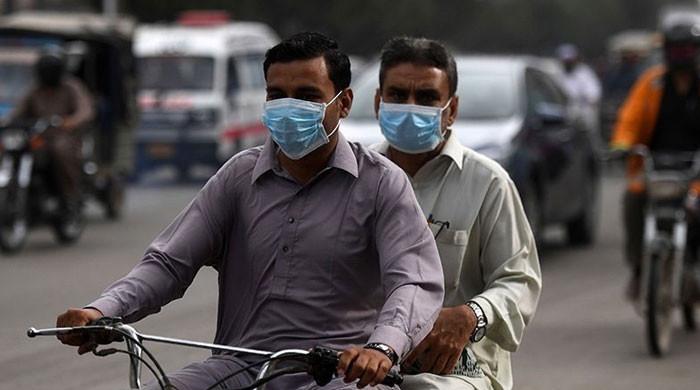“Poor air quality, smog adds to chances of respiratory illnesses. It is not COVID-19, but flu viruses,” says epidemiologist
- Thousands of influenza-like illness cases reported in Pakistan.
- NIH says H3N2 sub-type of Influenza-A virus is causing illness.
- COVID-19 positivity remained less than 1% during last week.
ISLAMABAD: The National Institute of Health (NIH) Islamabad has clarified that a type of influenza virus is causing severe respiratory illness in adults across Pakistan and not COVID-19, The News reported Wednesday.
Thousands of influenza-like illness (ILI) cases are being reported daily in the country, said the health institute, adding that the H3N2 sub-type of Influenza-A virus is causing the illness.
Among children, it is Respiratory Syncytial Virus (RSV) which is leaving them sick across Pakistan, NIH officials said. They urged people to take precautionary measures, including coughing etiquette, to prevent themselves from contracting respiratory illnesses.
“No, it is not COVID-19 that is making people sick these days in Pakistan. Our surveillance and testing indicates it is H3N2 sub-type of Influenza-A which is making people sick in Islamabad, Rawalpindi, many cities of Sindh and most of Punjab these days”, a senior official of NIH told The News.
The health official said people were blaming COVID-19 for respiratory illnesses. COVID-19 positivity remained less than 1% during last week when only 16 cases were detected across Pakistan after 3,609 tests conducted, he claimed. The majority of people were neither getting tested for COVID-19 nor the influenza-like illness, he added.
Severe Acute Respiratory Infections (SARI) were being reported from Khyber Pakhtunkhwa and Balochistan, the NIH official said.
According to NIH data, around 46,000 cases of ILI were reported in the country except Punjab during the 49th week of the year. The highest number of ILI cases was reported from Sindh where over 25,000 were detected, KP reported 8,354 cases, Balochistan 7,856 cases and Azad Jammu and Kashmir 3,619 cases.
Punjab, from where the bulk of respiratory illnesses are being reported, doesn’t share its data with NIH Islamabad. So, the authorities don’t have any idea of the respiratory disease burden in the largest province of Pakistan.
Commenting on the influenza outbreak in Pakistan, renowned infectious diseases expert Dr Faisal Sultan said influenza was being diagnosed more (due to the availability of PCR at many centres). “It is sometimes prolonged with weeks of fatigue associated with it,” he said.
“It’s known in some instances it can have a prolonged convalescence. Additionally, the vulnerable parts of the population — elderly or with other heart or lung conditions — will have more complications (bacterial pneumonia),” Dr Sultan said.
Health experts and pulmonologists in Karachi also confirmed influenza A was most commonly detected in the city as compared to COVID-19. It was causing severe disease to elderly people with comorbid (having other diseases like diabetes, hypertension etc), they said.
“Mostly, it is influenza. We have seen entire families infected with flu-like symptoms in Karachi. We have found the Infleunza-A virus as the cause of respiratory illness, sometimes causing the hospitalisation of the elderly with comorbid. In young adults it is self-limiting, which means they recover on their own,” Dr Raeef Ahmed, a pulmonologist in Karachi, said.
He urged people not to use antibiotics for the treatment of flu, saying that they had found good results of an antiviral medicine Tammy Flu among hospitalised adults.
To a query regarding the availability of flu shots or influenza vaccine, he said the vaccine was not available in the market. Now, it was a bit late to get vaccinated against the flu, he added.
Renowned epidemiologist Dr Rana Muhammad Safdar urged people to adopt the same precautions they used during the COVID-19 pandemic to prevent themselves from contracting the respiratory illness.
“Poor air quality, smog in Punjab, the federal capital, Khyber Pakhtunkhwa and other areas adds to chances of respiratory illnesses. It is not COVID-19, but flu viruses, which are making people sick,” he said.
Safdar advised the people to gargle with lukewarm salt water before going to bed to prevent chances of throat infection.

